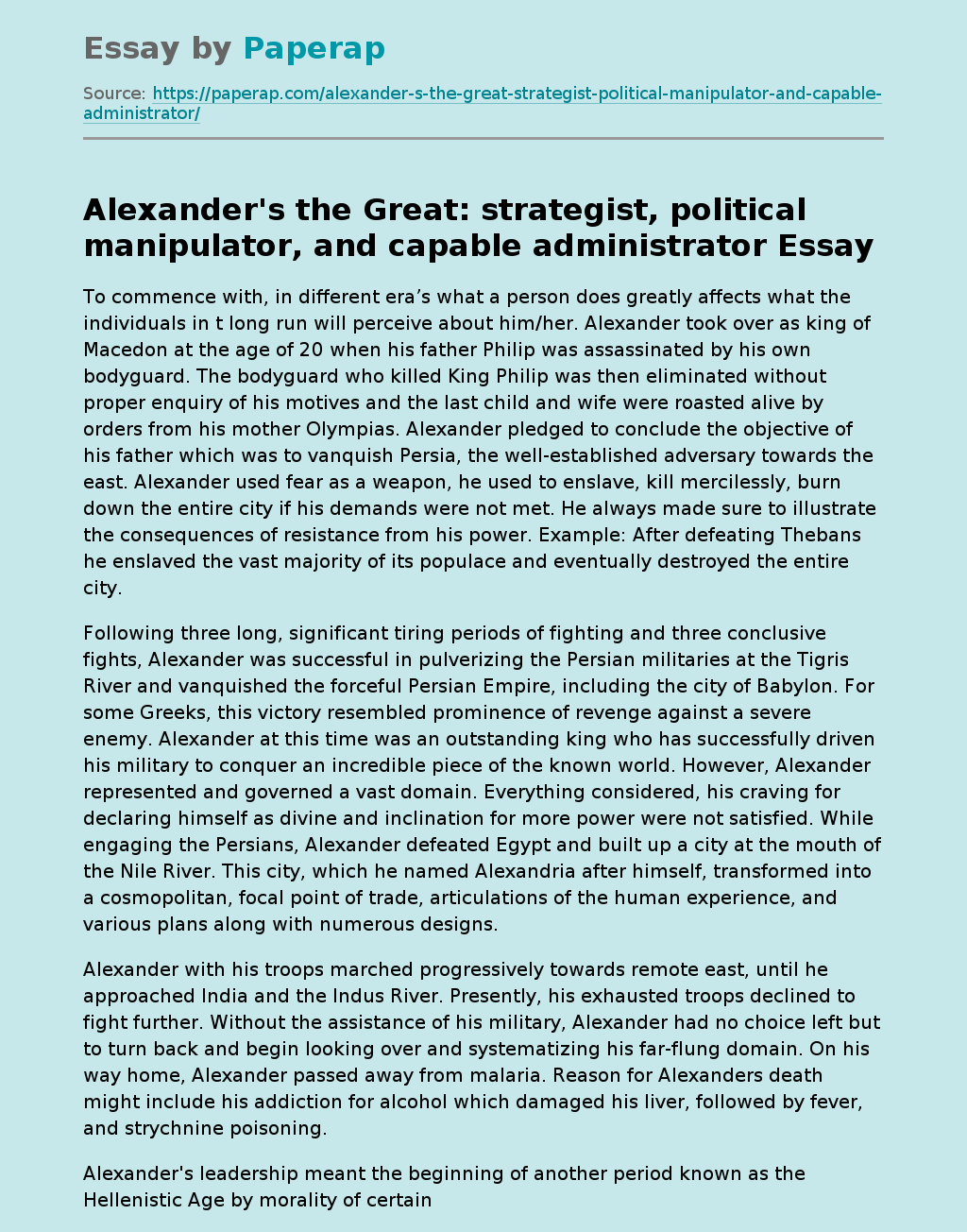Alexander: Strategist, Politician, Administrator
To commence with, in different era’s what a person does greatly affects what the individuals in t long run will perceive about him/her. Alexander took over as king of Macedon at the age of 20 when his father Philip was assassinated by his own bodyguard. The bodyguard who killed King Philip was then eliminated without proper enquiry of his motives and the last child and wife were roasted alive by orders from his mother Olympias. Alexander pledged to conclude the objective of his father which was to vanquish Persia, the well-established adversary towards the east.
Alexander used fear as a weapon, he used to enslave, kill mercilessly, burn down the entire city if his demands were not met. He always made sure to illustrate the consequences of resistance from his power. Example: After defeating Thebans he enslaved the vast majority of its populace and eventually destroyed the entire city.
Following three long, significant tiring periods of fighting and three conclusive fights, Alexander was successful in pulverizing the Persian militaries at the Tigris River and vanquished the forceful Persian Empire, including the city of Babylon.
For some Greeks, this victory resembled prominence of revenge against a severe enemy. Alexander at this time was an outstanding king who has successfully driven his military to conquer an incredible piece of the known world. However, Alexander represented and governed a vast domain. Everything considered, his craving for declaring himself as divine and inclination for more power were not satisfied. While engaging the Persians, Alexander defeated Egypt and built up a city at the mouth of the Nile River.
This city, which he named Alexandria after himself, transformed into a cosmopolitan, focal point of trade, articulations of the human experience, and various plans along with numerous designs.
Alexander with his troops marched progressively towards remote east, until he approached India and the Indus River. Presently, his exhausted troops declined to fight further. Without the assistance of his military, Alexander had no choice left but to turn back and begin looking over and systematizing his far-flung domain. On his way home, Alexander passed away from malaria. Reason for Alexanders death might include his addiction for alcohol which damaged his liver, followed by fever, and strychnine poisoning.
Alexander’s leadership meant the beginning of another period known as the Hellenistic Age by morality of certain effects that Greek culture had on different people. Without Alexander’s thirst for expansion of his empire, Greek values, teachings, and culture might have remained limited to Greece. Alexander’s inheritance was a land mass with blur future along with a thought of extending Greek human progress to more extensive world which not yet tried or demonstrated. Moreover, he depicted himself as the incredible, brilliant king and a self-pronounced god. His empire gradually collapsed because of lack of internal stability and denial by his troop members to further continue battling over masses. Alexander as a king of vast empire made many mistakes and one of them was not electing a successor for the throne. Because of this, after the death of Alexander his generals divided the lands including army and treasury and took control over them. Thus, the huge empire of Alexander slowly divided into three huge kingdoms.
According to me, as a warrior Alexander was a great strategist, political manipulator, and capable administrator. Example: He implemented the Persian arrangement of government, he attempted to coordinate the Greek and Persian privileged, made efforts to make Persians prepared in the Greek method for war. But, according to me he had two major flaws in his leadership which were not anticipated from the ruler of such a vast kingdom. First, he was so busy in conquering and expanding that he never planned for future of his kingdom and hence never elected any heir to his empire. Second, he was greedy (Example: annihilated many men, burned many cities, and captivated many women and children whenever his orders were not followed) and considered too highly of himself (Example: he named many cities after himself one of them is Alexandria).
To reiterate, what a person does greatly affects what individuals in the long run will perceive about that individual. That is, If Alexander would have planned and properly organize the conquered area in order to have an increasingly steady kingdom, he could have carried on with a long, prosperous life, maybe taking control of all of Asia or in any event setting the phase for his heir to administer the biggest realm the world had ever observed. Rather, he exhausted his troops and himself, and his heritage slowly vanished for eternity. Hence, according to me Alexander The Great was not so great.
Alexander: Strategist, Politician, Administrator. (2021, Dec 08). Retrieved from https://paperap.com/alexander-s-the-great-strategist-political-manipulator-and-capable-administrator/

